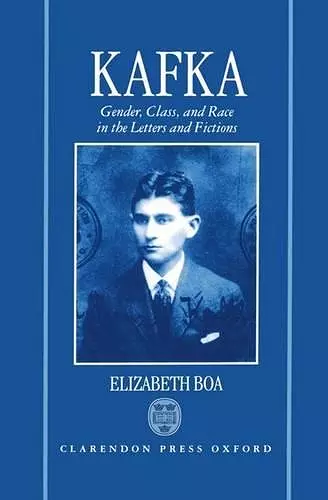Kafka: Gender, Class, and Race in the Letters and Fictions
Exploring the Intersections of Identity in Kafka's Works
Format:Hardback
Publisher:Oxford University Press
Published:6th Jun '96
Currently unavailable, and unfortunately no date known when it will be back

This insightful study explores how gender intertwines with other identity facets in Kafka's letters and fiction, revealing his complex relationship with societal stereotypes.
In Kafka: Gender, Class, and Race in the Letters and Fictions, Elizabeth Boa presents a compelling examination of how gender intersects with various aspects of identity in Kafka's work. This study delves into Kafka's portrayal of the male body and his critical engagement with stereotypes, including the New Woman, the Whore, and the assimilating Jew. Boa situates these images within the broader context of early twentieth-century ideologies, marked by sexism, racism, and militarism, revealing the societal pressures that influenced Kafka's narratives.
The author highlights Kafka's rejection of patriarchy while simultaneously critiquing how he utilized women as literary devices. By analyzing Kafka's correspondence with his fiancée and the Czech journalist Milena Jesenska, Boa uncovers the transformation of mundane details into Kafka's signature style, which is both strange and eerily familiar. This exploration sheds light on how Kafka's work reflects the complexities of identity during a time of societal upheaval and reactionary fervor.
Ultimately, Kafka: Gender, Class, and Race in the Letters and Fictions argues that gender cannot be examined in isolation from other identity dimensions. Boa's insights into Kafka's alienating depictions of male and female bodies reveal the intricate interplay of militaristic, racist, and class ideologies that permeate his literature. Through this lens, the book offers a fresh perspective on Kafka's subversion of stereotypes, solidifying his status within the modernist literary canon.
Boa certainly is very differentiated and admiringly clear in analyzing the intricate wyas in which gender, class, and race from complex conspiracies both in the fiction and in the letters of Franz Kafka. * Elfriede Poder, Austrian History Yearbook, Vol.31, 2000. *
It is a book that Kafka scholars need to ponder. * Germanic Notes and Reviews *
a series of wide-ranging often perceptive readings of the letters and fiction ... This study consolidates and adds to recent research on Kafka's relation to his social and ideological circumstances ... The ambiguities in Kafka's construction of women are well brought out, and a detailed and generally persuasive case is made that gender plays a crucial role in the nexus of Kafka's themes and, indeed, in much of literary modernism. For these reasons, and also because critics will find much to take issue with in the wealth of detail with which Boa presents her case, the book is likely to become a focal study in Kafka criticism. * William J Dodd, MLR 95.1, 2000 *
To the author's credit, this implicitly political project is made overt without blunting literary critical sensibilities ... a sensitive treatment of an oft-neglected aspect of his work. * Richard Heinemann, Madison, Winsconsin, Modern Philology *
Elizabeth Boa's book is a stimulating and at times controversial account of gender, class and race in Kafka's letters and works of fiction * Forum for Modern Language Studies, vol 35, no 3, 1999 *
ISBN: 9780198158196
Dimensions: 225mm x 144mm x 23mm
Weight: 552g
314 pages